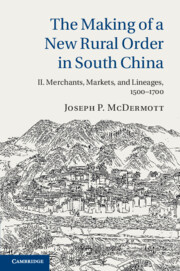Refine search
Actions for selected content:
26946 results in Economic history
Index
-
- Book:
- Feeding the People
- Published online:
- 25 June 2020
- Print publication:
- 25 June 2020, pp 297-306
-
- Chapter
- Export citation
Acknowledgements
-
- Book:
- Feeding the People
- Published online:
- 25 June 2020
- Print publication:
- 25 June 2020, pp 213-215
-
- Chapter
- Export citation
Bibliography
-
- Book:
- Feeding the People
- Published online:
- 25 June 2020
- Print publication:
- 25 June 2020, pp 252-296
-
- Chapter
- Export citation
Introduction - Pouring Ourselves a Large Gin
-
- Book:
- Feeding the People
- Published online:
- 25 June 2020
- Print publication:
- 25 June 2020, pp 1-22
-
- Chapter
- Export citation
Contents
-
- Book:
- Feeding the People
- Published online:
- 25 June 2020
- Print publication:
- 25 June 2020, pp vii-vii
-
- Chapter
- Export citation
Chapter 4 - Global Potatoes
-
- Book:
- Feeding the People
- Published online:
- 25 June 2020
- Print publication:
- 25 June 2020, pp 107-139
-
- Chapter
- Export citation
Recipes
-
- Book:
- Feeding the People
- Published online:
- 25 June 2020
- Print publication:
- 25 June 2020, pp xii-xiii
-
- Chapter
- Export citation
Chapter 3 - Free-Market Potatoes
-
- Book:
- Feeding the People
- Published online:
- 25 June 2020
- Print publication:
- 25 June 2020, pp 79-106
-
- Chapter
- Export citation
Supervisors against regulation? The Basel Committee and country risk before the International Debt Crisis (1976–1982)
-
- Journal:
- Financial History Review / Volume 27 / Issue 2 / August 2020
- Published online by Cambridge University Press:
- 25 June 2020, pp. 210-233
-
- Article
- Export citation
Chapter 1 - Immigrant Potatoes
-
- Book:
- Feeding the People
- Published online:
- 25 June 2020
- Print publication:
- 25 June 2020, pp 23-51
-
- Chapter
-
- You have access
- HTML
- Export citation
Copyright page
-
- Book:
- Feeding the People
- Published online:
- 25 June 2020
- Print publication:
- 25 June 2020, pp iv-iv
-
- Chapter
- Export citation
Chapter 5 - Capitalist Potatoes
-
- Book:
- Feeding the People
- Published online:
- 25 June 2020
- Print publication:
- 25 June 2020, pp 140-167
-
- Chapter
- Export citation
Abbreviations
-
- Book:
- Feeding the People
- Published online:
- 25 June 2020
- Print publication:
- 25 June 2020, pp xiv-xiv
-
- Chapter
- Export citation
Chapter 2 - Enlightened Potatoes
-
- Book:
- Feeding the People
- Published online:
- 25 June 2020
- Print publication:
- 25 June 2020, pp 52-78
-
- Chapter
-
- You have access
- HTML
- Export citation
Figures
-
- Book:
- Feeding the People
- Published online:
- 25 June 2020
- Print publication:
- 25 June 2020, pp viii-xi
-
- Chapter
- Export citation

The Making of a New Rural Order in South China
-
- Published online:
- 22 June 2020
- Print publication:
- 02 July 2020
CAPITAL FLOW BONANZAS AS A FUNDAMENTAL INGREDIENT IN SPAIN'S FINANCIAL CRISES, 1850-2015
-
- Journal:
- Revista de Historia Economica - Journal of Iberian and Latin American Economic History / Volume 40 / Issue 1 / March 2022
- Published online by Cambridge University Press:
- 22 June 2020, pp. 135-169
- Print publication:
- March 2022
-
- Article
-
- You have access
- HTML
- Export citation
EATING, DRINKING, PAYING. THE PRICE OF FOOD IN MONTEVIDEO IN THE LATE COLONIAL PERIOD
-
- Journal:
- Revista de Historia Economica - Journal of Iberian and Latin American Economic History / Volume 38 / Issue 2 / September 2020
- Published online by Cambridge University Press:
- 01 June 2020, pp. 249-278
- Print publication:
- September 2020
-
- Article
- Export citation
The origins of the Asia dollar market 1968–1986: regulatory competition and complementarity in Singapore and Hong Kong
-
- Journal:
- Financial History Review / Volume 27 / Issue 1 / April 2020
- Published online by Cambridge University Press:
- 26 May 2020, pp. 17-44
-
- Article
- Export citation
FHR volume 27 issue 1 Cover and Back matter
-
- Journal:
- Financial History Review / Volume 27 / Issue 1 / April 2020
- Published online by Cambridge University Press:
- 26 May 2020, pp. b1-b2
-
- Article
-
- You have access
- Export citation
